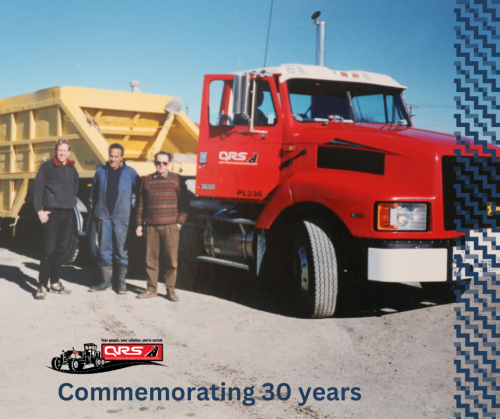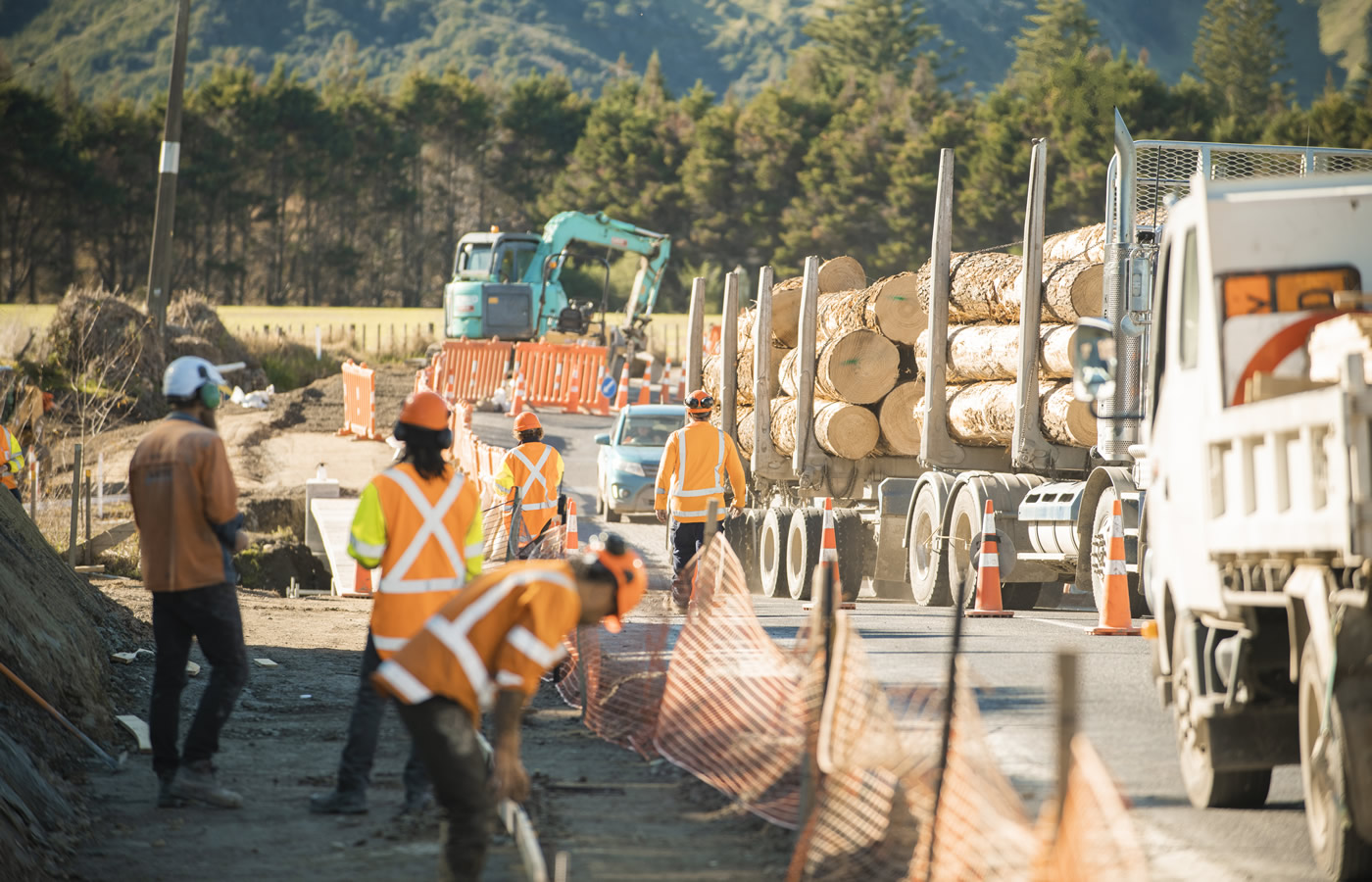
Connecting and growing our communities.
QRS celebrating 30 years of success

Current staff will mark the 30th anniversary of Quality Roading and Services surrounded by former employees and other valued guests on Friday as the company pauses to reflect on its contribution to Wairoa.
As we celebrate three decades it will be gratifying to be joined by many of those who played such a significant role in the company’s success,” says current chief executive Jeremy Harker.
Thirty years ago, on July 4, 1994, Quality Roading and Services (QRS) was established by its owner Wairoa District Council (WDC). The then Wairoa Mayor, Cliff Owen, described it as “a milestone in the history of local government”.
Since its inception QRS has played a vital role in Wairoa contributing to employment, the economic success of the region, community activities, and in many ways, local identity. Delivering jobs, growth, prosperity, and solutions for Wairoa is something QRS’s board and senior leadership team take seriously.
“We’re aware that QRS has quite literally helped shape this region and it’s a privilege to be able to celebrate that with friends and whānau of the company this week.”
A bold beginning
The company that eventually became QRS, had its beginnings in 1991, when WDC turned its inhouse roading division into a separate roading business unit.
In 1994, that unit became a Local Authority Trading Enterprise, and later a Council-Controlled Trading Organisation. Council’s vision was that the company would operate competitively, achieve more for Wairoa’s roads and communities, all the while generating a profit.
The founding board members were Tony East (chair), Arthur Blair, Ken McEwan, and Dennis Munro, and they received $1.2 million in capital to launch the company.
In its early days, QRS focused on roading maintenance, construction, and the upkeep of Wairoa’s parks and utilities.
On any given day staff like Phil Tipu, who remains QRS’s only original staff member, could be mowing parks and reserves, unclogging blocked sewerage pipes, cleaning the main street, reading water meters, or digging graves.
After an initial grace period with preferential treatment for contracts, WDC’s emphasis on competitive tendering catapulted QRS into a challenging marketplace in the late nineties. It lost several major contracts with its council owner.
Despite these hardships, QRS proved to be nimble. “Adapting to change is one of this company’s greatest strengths,” reflects Jeremy, who has been with QRS for nine years, three of which as chief executive. “When we’ve needed to pivot, we can turn things around.”
This adaptability helped the company weather the financial pressures then thrive during a period of growth from 2005 to 2008 under the leadership of Leigh Aitken. Plant and people were added to the business at a phenomenal rate. Wairoa’s geographically remote location between two port cities proved then, as it does now, to be a competitive advantage for QRS.
Challenges and triumphs
The relationship between QRS and its owner and customer WDC, is unique and has been tested at times. Newspaper articles documenting the past 30 years reveal that more than once, WDC councillors debated whether to sell QRS. Conversations would take place in council chambers and letters to the editor. Then, arguments for the community’s reliance on QRS’s local knowledge and its role as a stabilising force in Wairoa’s economy would always tip the scales against privatisation.
In 2013, QRS secured the WDC contract for unsealed roads, a critical win that shored up job security for 90 staff and underscored QRS’s growing reputation. While 2017 brought financial losses and strained relationships, a local government review affirmed QRS’s value to Wairoa, paving the way for a renewed focus. Just two years later QRS was certified as a New Zealand Transport Authority Tier 1 supplier, proving the small rural company could compete with the industry’s biggest players and take on large jobs.
From roads to resilience
Since Leigh Aitken, there have been three more chief executives: Mark Brown, Nigel Pollock, and Jeremy Harker. Board leadership has transitioned from Tony East to Dennis Munro, Chris Torrie, and the current chair, Guy Gaddum.
Jeremy Harker began as chief executive just before New Zealand’s second Level 4 lockdown in August 2021. Having dealt with the challenges posed by the global pandemic, Jeremy has overseen steady company growth and then the company’s response to one of the region’s greatest modern-day challenges, Cyclone Gabrielle.
The February 2023 cyclone devastated much of Wairoa, during which time QRS’s response was described by one Councillor as heroic. The company played a critical role in recovery efforts, cementing its place as more than just a construction and roading enterprise—it became a lifeline for the community. This culminated in record $1 million contributions to WDC in 2023 and 2024, showcasing QRS’s unwavering commitment to its hometown.
A legacy of community spirit
While previous councils considered the idea of a full or partial sale, current Mayor Craig Little and his council have backed QRS, says board chair Guy Gaddum.
Over the past three years, Wairoa’s local government representatives have passionately advocated for Wairoa to receive the funding it requires to prosper and grow. “We see that behind-the-scenes commitment, and so we go the extra mile to maximise any hard-won roading construction, repair, and maintenance funding, to achieve safe well-maintained roads.”
Beyond infrastructure, QRS’s impact runs deep into the heart of Wairoa. It’s returned millions of dollars as dividends and contributions to WDC over the years. And its given away over $1 million to local sponsorships, schools, sports teams, and community initiatives via cash contributions, work-in-kind, and people power.
Looking ahead
As QRS celebrates three decades of service, its focus remains steadfast: supporting Wairoa’s growth and resilience. Winning the Outstanding Social Impact Award at this year’s Hawke’s Bay Business Awards is a testament to the company’s transformative role in the community.
The last word goes to Guy Gaddum who has been a QRS director for 17 years, and eight years as chair. “Through three decades of resilience, adaptability, and community connection, QRS has solidified its place as a nationally-recognised supplier of roading and infrastructure services, and a cornerstone of Wairoa’s economy and community.”
“We can all take pride in 30 years of success for QRS.”
ENDS
Image caption
First QRS manager Leigh Aitken pictured with highly respected truck operator Jake O’Neil and board member Arthur Blair in front of a new International S Liner bottom dumping unit circa 1994.
12 December 2024
Disclaimers and Copyright
While every endeavour has been taken by the to ensure that the information on this website is
accurate and up to date, shall not be liable for any loss suffered through the use, directly or indirectly, of information on this website. Information contained has been assembled in good faith.
Some of the information available in this site is from the New Zealand Public domain and supplied by relevant
government agencies. cannot accept any liability for its accuracy or content.
Portions of the information and material on this site, including data, pages, documents, online
graphics and images are protected by copyright, unless specifically notified to the contrary. Externally sourced
information or material is copyright to the respective provider.
© - www.qrs.co.nz / +64 6 838 9030 / office@qrs.co.nz
